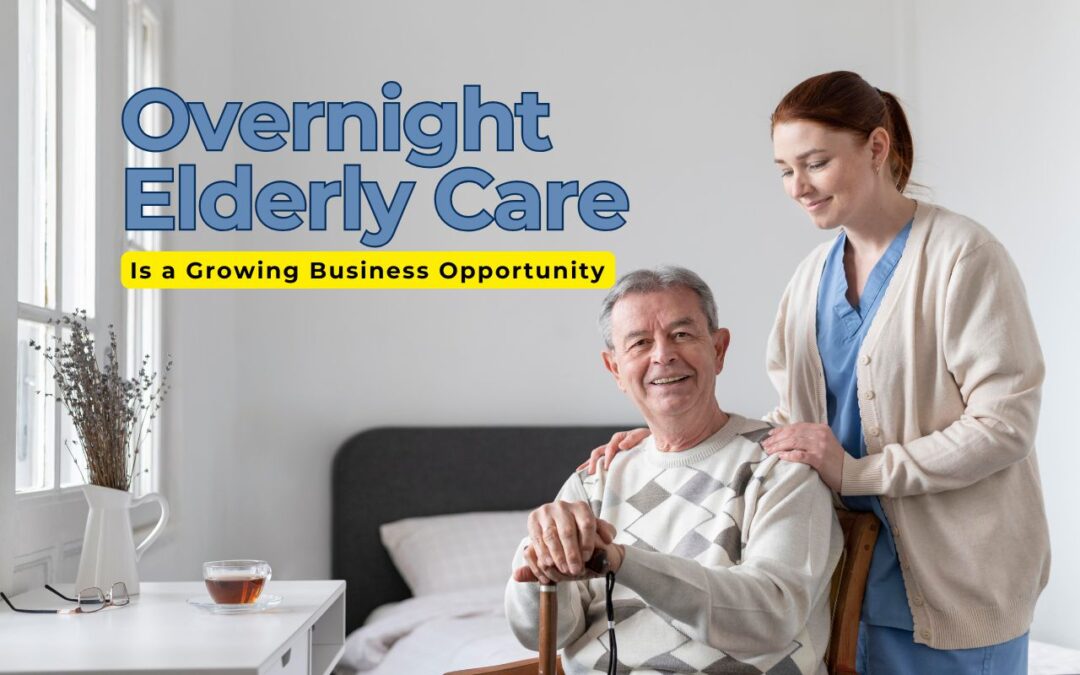In recent years, the healthcare and eldercare industries have witnessed a dramatic surge in demand—driven largely by demographic shifts and changing societal structures. One of the most significant and often underappreciated segments within this sphere is overnight elderly care. As the world’s population continues to age and the number of seniors requiring round-the-clock assistance rises, overnight care is emerging as a crucial service that bridges a vital gap in caregiving.
This article explores why offering overnight elderly care services is not just a compassionate venture, but also a sustainable and scalable business opportunity. We’ll look at aging population trends, market demand, the unique needs overnight care addresses, and how businesses can tap into this growing sector.
The Global Aging Population: A Macro-Level Shift
The Numbers Speak Volumes
According to the World Health Organization (WHO), the number of people aged 60 years and older is expected to double by 2050, rising from 1 billion in 2020 to 2.1 billion. By 2030, one in six people in the world will be aged 60 years or over. This represents a massive transformation of the global demographic profile, with profound implications for healthcare systems, social services, and businesses.
In countries like the United States, Canada, Japan, and much of Europe, the “Silver Tsunami” is already underway. Meanwhile, nations such as India and China are seeing their elderly populations rise rapidly due to better healthcare and declining fertility rates.
Implications for Caregiving
As people live longer, they are more likely to develop age-related health conditions such as:
- Dementia and Alzheimer’s
- Parkinson’s Disease
- Arthritis
- Cardiovascular diseases
- Diabetes and related complications
Many of these conditions require not only medical supervision but also daily assistance and overnight monitoring, especially for those living alone.
Changing Family Structures and the Decline of Informal Care
From Joint to Nuclear Families
In many cultures, elder care was traditionally handled within the family unit. However, urbanization, increased mobility, and evolving social norms have led to the breakdown of extended family systems. In many countries, young adults move to cities for work, leaving aging parents behind.
This has led to:
- A reduction in available informal caregivers
- Increased reliance on professional care services
- A heightened need for reliable, trustworthy overnight care
The Caregiver Burnout Crisis
Even when family members attempt to provide care, the emotional and physical burden often leads to caregiver burnout. This is especially true during the night when emergencies are more likely and caregivers are sleep-deprived. Overnight care services not only fill this gap but offer respite and peace of mind to families.
What Is Overnight Elderly Care?
Overnight elderly care refers to professional caregiving services provided during nighttime hours—typically from around 8 PM to 8 AM. Services can be provided at the elder’s home, in assisted living facilities, or specialized care centers.
Key Features of Overnight Care
- Monitoring Vital Signs
- Administering Medications
- Assisting with Bathroom Use
- Preventing Nighttime Wandering (common in dementia patients)
- Handling Emergencies
- Offering Emotional Support and Comfort
This service is especially vital for seniors who:
- Live alone
- Have chronic conditions
- Are recovering from surgery
- Have cognitive impairments
Why Overnight Care Fulfills a Unique Niche
Unmet Nighttime Needs
Most home care services operate during the day. However, a significant percentage of incidents involving seniors—such as falls, strokes, or breathing difficulties—occur at night. Overnight care helps:
- Reduce hospital readmissions
- Enhance recovery
- Improve sleep quality
- Lower anxiety levels
Safety and Peace of Mind
Family members, especially adult children, often worry about their aging parents’ well-being at night. Overnight care offers assurance that help is available should an emergency arise, allowing everyone to sleep more peacefully.
The Economic Opportunity: Why It’s Smart Business
Market Size and Growth
The global elderly care market was valued at over USD 900 billion in 2023, with projections to surpass USD 1.6 trillion by 2030, growing at a CAGR of 7-8%. Overnight care is a fast-growing subsegment within this market.
In India alone, the geriatric care market is forecasted to grow from USD 10.72 billion in 2024 to over USD 18 billion by 2031. Countries like the U.S., Canada, Japan, and Australia are seeing similar trends.
High-Value Service with Recurring Revenue
Overnight care is often charged at a premium due to its specialized nature. Since care is needed regularly—often nightly—it creates a predictable revenue stream for providers. Many agencies bundle overnight services into monthly care packages, adding stability to their financial models.
Competitive Landscape: Still an Open Playing Field
Unlike traditional home care or day care centers, overnight elderly care is still an underserved market. Many agencies provide only daytime support or operate during standard hours. This leaves a gap in services, particularly in rural and semi-urban areas, where options are limited.
Low Market Saturation
Due to licensing, staffing, and operational complexities, fewer players operate in the overnight space. This presents an opportunity for early movers to:
- Establish brand leadership
- Develop specialized services
- Gain customer loyalty
Building an Overnight Care Business: Key Considerations
1. Licensing and Regulations
Different regions have varying regulations concerning overnight elderly care. Entrepreneurs should:
- Research state and national guidelines
- Ensure staff certifications (nursing, CPR, first aid)
- Maintain data privacy and compliance with health laws
2. Staffing and Training
Overnight care requires well-trained, trustworthy, and compassionate caregivers who are alert and capable of handling medical or psychological emergencies.
Key training includes:
- Dementia care
- CPR and first aid
- Emergency response
- Medication management
3. Technology Integration
Smart tools can enhance service quality:
- Fall detection devices
- Remote monitoring systems
- Health tracking apps
- Secure communication platforms for families
By integrating tech, businesses can offer hybrid care models that combine human attention with digital oversight.
4. Pricing Strategy
Overnight care is a premium service. Transparent pricing models should include:
- Hourly or nightly rates
- Tiered packages (basic, intermediate, advanced)
- Discounts for long-term contracts
Challenges and How to Overcome Them
Staffing Challenges
Night shifts are less appealing to many caregivers. Address this by:
- Offering higher pay rates for night shifts
- Creating flexible scheduling options
- Providing training and career growth incentives
Trust and Safety
Families are entrusting their loved ones to your care during vulnerable hours. To build trust:
- Conduct thorough background checks
- Provide detailed caregiver bios
- Allow families to meet caregivers in advance
Operational Costs
Running a 24/7 operation requires significant investment in staff, facilities, and tech. Reduce costs by:
- Starting small with home-based care models
- Partnering with existing elder care facilities
- Using on-demand staffing models
Case Study: The Success of “NightGuard Care Services”
Let’s consider a fictional yet plausible example: NightGuard Care Services, a startup launched in Bangalore, India, in 2022. They began by offering overnight care packages tailored to dementia patients. With just 10 caregivers, they launched services across five neighborhoods. By 2025, their clientele had tripled, and they expanded to Mumbai and Delhi.
Key strategies:
- Niche marketing: dementia and post-operative care
- Tech-enabled caregiver tracking
- Partnership with local hospitals for referrals
They are now exploring franchising opportunities—proof that a focused, high-quality overnight care service can scale rapidly.
Opportunities for Innovation
Entrepreneurs can explore adjacent or integrated services such as:
- Telehealth Support: Connecting doctors on call overnight
- Mental Health Check-ins: For loneliness, anxiety, or depression
- Home Safety Audits: Fall-proofing homes
- Nutrition Planning: Preparing late-night meals or post-medication snacks
These value-added services increase client satisfaction and open up additional revenue streams.
Conclusion: The Right Time to Step In
As the aging population grows and societal norms evolve, overnight elderly care is no longer a luxury—it’s becoming a necessity. The emotional, physical, and logistical support that overnight care provides meets a very real need for seniors and their families.
From a business perspective, this is a high-demand, low-supply market ripe for innovation, impact, and sustainable revenue. With the right combination of empathy, strategy, and operational excellence, entrepreneurs and care providers can turn overnight elderly care into a thriving venture that genuinely makes a difference.












